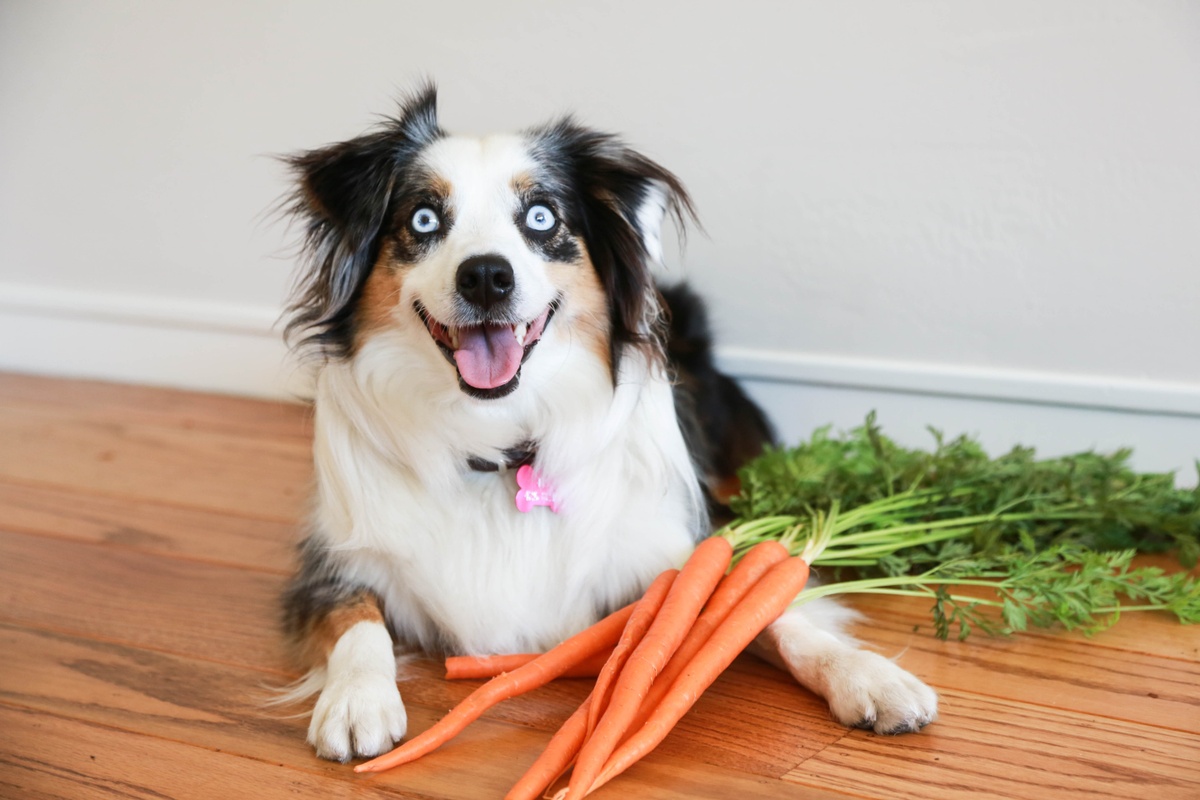Can dogs eat carrots?
We’ll spare you the suspense.
Yes.
Dogs can eat carrots. We’d actually even encourage it!
In moderation, of course. Carrots offer a host of health benefits for your dog and make for a nutritious and budget-friendly treat alternative. They’re also great in meals, and a fixture in most of our recipes.
But they’re so much more than just that.
First, what exactly makes carrots healthy for dogs?
Low in calories, low in fat
Treats should only make up about 10% of the calories your dog’s eating, but we all love how excited our dog gets with a little extra reward. And carrots, in many ways, are the perfect low-cal treat option. A medium-sized carrot has only 25 calories, contains very little fat and is chock-full of nutrients. Plus your dog will love them ― win-win-win-win. And if your dog’s carrying a little extra weight, carrots can still serve as a great reward without packing on the pounds.
Cleaner teeth
Crunchy vegetables and fruits (like carrots) that require a little extra chewing can actually serve as great dental treats, too, helping to clean your canine’s teeth. While it won’t replace the importance of regular brushing, it can help keep those pearly whites polished. For young puppies, carrot sticks can even help soothe gums during the teething phase.
Source of vitamin A…
Carrots are a great source of potassium, vitamin B6, vitamin C and, most of all, vitamin A (or retinol). Vitamin A is a fat-soluble vitamin that dogs require daily. It’s particularly important for the health of your dog’s eyes, skin and coat, and immune system. It’s also necessary during growth and development.
… and β-carotene + antioxidants
Likewise, they’re a great source of β-carotene, which dogs can actually convert into vitamin A. (Interestingly enough, cats cannot do this.)
β-carotene is what’s known as a carotenoid, responsible for the bright colors of fruits and vegetables. And in the case of carrots, that bursting, luscious orange. While there are hundreds of carotenoids, not all of them can be converted to vitamin A like β-carotene can, however, all carotenoids are antioxidants which can help protect your dog’s body and prevent disease.
To note: β-carotene is the most abundant antioxidant found in carrots, but it isn’t the only one — other phytonutrients found in carrots can also help defend the body. Together these antioxidants further protect your dogs eyes and skin from damage, support immune health, and can help fight diseases (like cancer).
Source of fiber
Carrots are even a great source of fiber, which can benefit dogs in ways great and small. The big one being digestive and gut health through microbiome support, and improved regularity and stool consistency.
And guess what? Regular bowel movements can help limit toxin exposure and reduce the chance of colorectal cancer. Eating fibrous foods like carrots has also been linked to improve heart and kidney health, immune system support, weight loss and blood sugar control — all of which can help dogs manage and prevent chronic diseases.
Just one last thing you might be asking yourself.
Can dogs eat raw carrots?
What about cooked carrots? Short answers: Yes and yes. Both can be beneficial for your pup.
We haven’t been shy about the fact that carrots are nutritious, fun, versatile, great alone and great in recipes. How you provide carrots to your dog will simply depend on your dog’s preferences, as well as your own.
Cooked carrots make a great addition at mealtime, and cooking can also help improve the digestibility and availability of some of the nutrients in carrots. Steaming carrots is a safe way to cook them yourself, from there you can:
- Mash them for easier chewing
- Halve them for easier gnawing
- Cube them for regular, pre-portioned servings
- Puree them for a fancier presentation
- Freeze them for a bone-like treat or a soothing teether
Get creative. Warm or cold, they’re an unexpected treat for dogs on their very best behavior.
Raw carrots are also safe and easy to give to your dog, plus they’ve got that satisfying crunch (you know the crunch) — just be sure to wash them well to remove dirt and pesticides.
Smaller dogs and puppies may be better off with baby carrots, or smaller pieces, to help prevent choking. Though on the flip side, oversized carrots can also serve as a bone-like treat for dogs who can’t help but chew, or for owners looking for a slower-eating-but-still-nutritious treat to keep their dog occupied.
As always, be sure to play hall monitor. Especially if it’s their first time eating a carrot.
Bottom line
However you decide to incorporate carrots into your dog’s diet, do it proudly. Healthy, safe and particularly dog-friendly, carrots are some of the best munchies out there.
That said, you can overdo it. Giving your dog too many carrots might lead to an upset tummy. It also means your dog will eat less of something else nutritious. We recommend checking in with your veterinarian before any serious dietary change to provide some expert insight on a safe amount of carrots for your dog’s size and needs.




